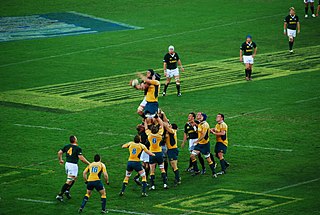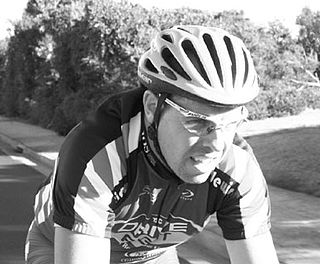The Olympic Winter Institute of Australia (OWIA) is an Olympic & federal government-funded elite sports training institution of Australia for the purpose of training athletes and coaches in sports involved in the Winter Olympics.
The Australian Olympic Committee (AOC) in co operation with the Australian Institute of Sport (AIS) formed the Australian Institute of Winter Sports after the 1998 Winter Olympics. The organisation was renamed to the Olympic Winter Institute of Australia on 1 July 2001. It provides training in alpine skiing, freestyle skiing (including aerial and mogul), snowboarding, short track speed skating and figure skating. It is also became a partner with the AIS in skeleton (toboganning). [1]
It was given a million-dollar annual budget and for the first time, Australia had a federal government-funded full-time training program to accompany the AIS. The inaugural chairman was Geoff Henke who was the Australian Winter Olympic team manager from 1976 to 1994, and who was credited with improving Australia's performance in winter sports by making it a higher priority among his fellow administrators. [2] This led to a steady rise in the number of Australians who have won medals at World Cup events in the immediate years after the OWIA's creation. [1]
The AOC is the peak body responsible for Australia's participation at the Olympics. Aside from funding the participation at the Olympics, it also provides money for the training and preparation of athletes. This occurs through funding of the OWIA, grants for athletes to travel overseas to compete, and by providing monetary awards to athletes and their coaches if they win medals at World Cup events or World Championships in the lead up to the Olympics. The funding of the OWIA by the AOC varied by year, but has been at A$1,000,000 per year for over 6 years. [3] Through the Australian Sports Commission, the federal government also sponsors OWIA to the tune of more than a million dollars a year. [4]
In 2009, the OWIA lobbied the government to increase its annual budget from A$2.1m to A$29.4m (which is still only a fraction of the A$132m that Canada, the host of the 2010 Olympics is spending.) which was not successful. The OWIA secured an additional A$1m taking its budget to A$3.1m in 2010. Australia aimed to win two medals in 2010; [5] it left the games with 3.

The Winter Olympic Games is a major international multi-sport event held once every four years for sports practiced on snow and ice. The first Winter Olympic Games, the 1924 Winter Olympics, were held in Chamonix, France. The modern Olympic Games were inspired by the ancient Olympic Games, which were held in Olympia, Greece, from the 8th century BC to the 4th century AD. Baron Pierre de Coubertin founded the International Olympic Committee (IOC) in 1894, leading to the first modern Summer Olympic Games in Athens, Greece in 1896. The IOC is the governing body of the Olympic Movement, with the Olympic Charter defining its structure and authority.

The 1980 Winter Olympics, officially known as the XIII Olympic Winter Games, was a multi-sport event which was celebrated from February 13 to February 24, 1980, in Lake Placid, New York, United States. This was the second time the Upstate New York village hosted the Games, after 1932. The only other candidate city to bid for the Games was Vancouver-Garibaldi, British Columbia, Canada, which withdrew before the final vote

The 2010 Winter Olympics, officially known as the XXI Olympic Winter Games and commonly known as Vancouver 2010, was an international winter multi-sport event held from February 12 to 28, 2010 in Vancouver, British Columbia, Canada, with some events held in the surrounding suburbs of Richmond, West Vancouver and the University Endowment Lands, and in the nearby resort town of Whistler.

The Australian Institute of Sport (AIS) is a high performance sports training institution in Australia. The Institute's headquarters were opened in 1981 and are situated in Canberra. The 66-hectare (163-acre) site campus is in the northern suburb of Bruce. The AIS is a division of the Australian Sports Commission; a body controlled and funded by the Australian Government.

Australia has sent athletes to all editions of the modern Olympic Games. Australia has competed in every Summer Olympic Games, as well as every Winter Olympics except 1924–32 and 1948. In 1908 and 1912 Australia competed with New Zealand under the name Australasia.

The Australian Olympic Committee (AOC) is the National Olympic Committee responsible for developing, promoting and protecting the Olympic Movement in Australia. The AOC has the exclusive responsibility for the representation of Australia at the Olympic Games, the Youth Olympic Games and at Regional Games patronised by the International Olympic Committee (IOC). All National Olympic Committees are constituents of the International Olympic Committee.

Australia first competed in the Winter Olympic Games in 1936 in Garmisch-Partenkirchen, and has participated in every games since, with the exception of the 1948 Games in St. Moritz.

Zali Steggall is an Australian politician, lawyer and former Olympic athlete serving as Member of Parliament (MP) for the Division of Warringah since 2019. She is also Australia's most internationally successful alpine skier, winning a bronze medal in slalom at the 1998 Winter Olympics in Nagano, and a World Championship gold medal in 1999. In the Winter Olympics she is Australia's first individual medalist, first female medalist, and only medalist in alpine skiing. Steggall's Olympic career extended from Albertville in 1992 to Salt Lake City in 2002.

Australia has competed in every Winter Paralympics. In 1976, the first Games, Australia's sole competitor was Ron Finneran, but he was not an official entrant. In 1980, Kyrra Grunnsund and Peter Rickards became the first official competitors, in alpine and cross-country skiing. The number of Australian athletes increased to three, five, five and six at the next four games, respectively, and all of the athletes were alpine skiers. The participation decreased to four in 1998 and climbed back up to six in 2002. Australia won its first Winter Paralympic medals in 1992, and has medalled at every games since then. All of the medals have been won in alpine skiing.

Winter Sports in Australia encompasses a great variety of activities across the continent of Australia, including winter sports played in snow and ice such as ice hockey. Climate varies considerably from the tropical North to temperate South in Australia, and sporting practices vary accordingly. Ice and snow sports like Skiing in Australia are conducted in the high country of the Australian Alps and Tasmanian Wilderness. Australia has relatively low mountain ranges, but a long history of participation in recreational skiing and the Winter Olympic Games. Australians have won olympic gold in ice skating, skiing and snow-boarding events. Australia's generally flat geography and usually mild winter climate otherwise provide ideal conditions for international non-snow/ice winter sports and team games like Rugby Union Football, Rugby league Football and Association Football (Soccer), which are all popular sports during the Australian winter and in which Australia has enjoyed considerable international success. Australian rules football is a home-grown winter football code with a wide following throughout Australia. Many other sports are also played or watched in Australia through the winter season.

Sport Australia (SA), formally the Australian Sports Commission (ASC), is the Australian Government agency responsible for supporting and investing in sport in Australia. The commission is composed of Sport Australia and the Australian Institute of Sport, taking the branding and identity of the former.
Paralympics Australia (PA) previously called Australian Paralympic Committee (APC)(1998–2019) is the National Paralympic Committee in Australia for the Paralympic Games movement. It oversees the preparation and management of Australian teams that participate at the Summer Paralympics and the Winter Paralympics.
Geoffrey "Geoff" John Henke, AO is a former Australian ice hockey player and Australian Olympic Committee official. He was the chef de mission of the Australian Winter Olympic delegations from 1976 until 1994, and is credited with ending the neglect of winter sports in Australia.

Robert Colville Crowe, OAM is an Australian Champion Cyclist who competed in the 1992 Barcelona Olympics and as Kieran Modra's pilot in the 2004 Athens Paralympics. He also directs the popular indoor cycling engine-training school at Ridewiser in Melbourne, Australia.
Katya Crema, often simply known as Kat, is an Australian alpine and ski cross skier from Melbourne, Victoria. Competing at the 2010 Winter Olympics, she finished fifteenth. Crema has also skied on the Winter X-Games circuit, making her debut in 2010.
The organisation of sport in Australia has been largely determined by its Federal system of government – Australian Government and six states and two territories governments and local governments. All three levels play an important role in terms of funding, policies and facilities. Each major sport is managed by a national sports organisation, with state counterparts that manage community sporting clubs. Umbrella or peak organisations represent the interests of sports organisations or particular sport issues. Education sector plays a small role through universities and schools. Private sector's involvement is extensive in professional sport through facilities, club ownership and finance/sponsorship.
Disabled Wintersport Australia (DWA) was established in 1978 as the Australian Disabled Skiers Federation. Its current mission is "to promote and foster the advancement of participation by people with a disability in wintersport both in Australia and overseas". DWA is a member of the Australian Paralympic Committee. DWA plays a major role in the development of Australian athletes that compete at the Winter Paralympics.

The 2019 Winter Universiade, the XXIX Universiade, was an international student and youth competition, which took place from 2–12 March 2019 in the Russian city of Krasnoyarsk. The 2019 Winter Universiade was the third Universiade hosted in Russia and second as an independent country. The first Universiade, when Russia was a Soviet Republic, was hosted by Moscow in 1973, whereas Kazan, capital of the Republic of Tatarstan, hosted the 2013 Summer Universiade. It is the first Winter Universiade hosted by Russia, and the second time that the event was held in a former USSR republic.
The ACT Academy of Sport (ACTAS) was launched in 1989. It is an endorsed Australian Olympic Committee and Australian Paralympic Committee National Training Centre and a member of the National Institutes of Network.

Australia is scheduled to compete in the 2017 Asian Winter Games in Sapporo and Obihiro, Japan from 19 to 26 February. This will mark the debut of the country at the Asian Winter Games, however its athletes are not eligible to win any medals, as the team is classified as guest competitors.